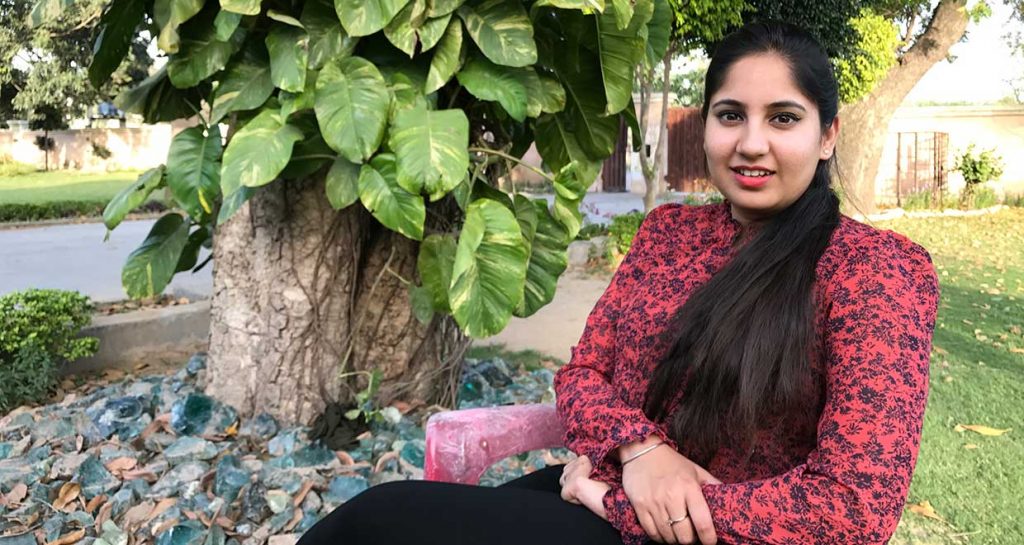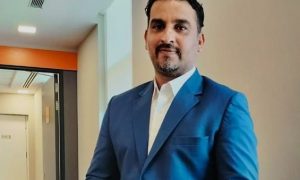Harshleen Kaur graduated from University of Legal Studies, Panjab University, in 2015. During her time as an undergraduate, she has interned with the likes of Philips Electronics India Limited, Bharti Airtel Limited, Reed Elsevier, among others. She is currently in-house counsel at online shopping portal ShopClues.
In this interview we speak to her about:
- Her diverse internships
- Her time at ShopClues
- Being in-house counsel
How would you like to introduce yourself to our readers?
Someone who aspired to become a designer but ended up becoming lawyer, as strongly enforced by destiny. Nevertheless, unquestionably an in- house legal counsel by dint of my peculiar, rather unconventional choice. I love my work and area of practice. I am extremely enthusiastic about my work and love to take up complex challenges. I believe in making and maintaining good relationships so that people remember me for the kind of person I am.
What motivated you to pursue law?
Well, I did not choose law as a career option until I was guided to do so by my counselor. My initial aim was to get into one of the best design schools of India but was unsuccessful in clearing the requisite entrance exam. Disheartened with the result, I decided to visit a counselor as I was unsure about what I wanted to become and what options I had. My counselor after evaluating my skills suggested I become a lawyer. Convinced by his rationale and strongly believing the result of the assessment, I decided to pursue law. And as they say “what is meant to be always finds a way”. I was, perhaps, destined to be a lawyer.
Career counseling played a pivotal role in my life. I would strongly recommend students who aren’t very well versed with the options available to them or are confused about what do in life, to opt for career counseling. Career counseling seeks to help you pick out a career that is tailor made to an individual’s interest, aptitude, needs and personality. Hence, it helps you to choose the right career for yourself and ultimately leading to professional success and contentment.

What subjects did you take particular interest in during your law school days?
I loved studying Intellectual Property Rights. With the advent of information technology, which our generation has been an eye witness to, intellectual capital has gained substantial importance. With intellectual works being accorded the same protections that real estate or other forms of property enjoy under the law, intellectual property and rights attached thereto have become precious commodities and are being fiercely protected. Amused by the protections available I was and I am interested in learning more about the subject. But however, this was not a deciding factor in determining my career choice. Taking an in house-counsel role was primarily driven by my internship experience.
What kind of internships did you engage in during your student years?
I started with basic internships in Human Rights Commission and State Legal Service Authorities, Chandigarh. These helped me understand the rights available under law to an aggrieved person and free legal aid services to certain weaker and underprivileged individuals in the society. It also helped me in understanding the procedure followed by Lok Adalats and appropriate skills required for amicable settlement between parties. I also visited the most special homes of India, a Juvenile Home in order to devise an acumen of the conditions, facilities, ideologies, sensibility of the inmates.
I then moved on to corporate internships so as to understand the nature of legal work embarked upon by the legal counsels in the companies. I interned at Philips India Limited in Gurgaon for a month and assisted their legal team in auditing the modern trade agreements and also supported them on a project regarding slum sale of audio-visual business of the company. I got a flavour of what an in-house counsel does and that inspired me to take up the legal profession as an in-house legal counsel. Since I had clarity about my preference for working as an in-house legal counsel, I focused more on corporate internships. I did my consequent internships in Bharti Airtel, Vasant Kunj and Reed Elsevier, Gurgaon. All my corporate internships helped me enormously to understand the basic skills which an in-house counsel is required to possess and a basic understanding of the applicable laws to various industries which do not form a part of the curriculum during the legal course.
Apart from corporate internships, as a part of academic internships I worked under various lawyers in District Court and Punjab and Haryana High Court at Chandigarh. I also interned as a law researcher in office of Justice M.S. Chauhan, Panjab and Haryana High Court under the ambit of judicial internship.
As per me all the internships are learning mechanisms where we can afford to ask silly questions and make mistakes. It helps us understand our weaknesses and turn them into strengths so that we becomes better and better in whatever area of work we intend to undertake.
When and why did you make the decision to be an in-house counsel?
Frankly speaking, interning or working in a law firm never fascinated me. I had heard enough stories from my peers and seniors on the amount of time they had to give in working for a firm. Everyone has a different personality and I strongly oppose stressful working hours, as I feel occupational stress impacts our overall well-being. Working in a stress-free environment intensifies one’s capabilities and I found that working as an in-house counsel you do not have to juggle between court and office that often, as compared to working in a firm. I was attracted to the working culture of the companies during my corporate internships.This work experience during my internships gave me the confidence that I am well suited for the profession and combined with my constant efforts to learn more on my own I felt well prepared for the corporate world. I focused on more corporate internships and remained in touch with most of the people I worked with. I was fortunate enough that the legal team at Philips remembered me even after two years of my internship and during my fifth year final exams, I was asked to join the legal team at Philips for an ongoing demerger project.

How were the first few years after your graduation?
UILS placements were a little difficult during my time. I was lucky to have a job before I finished with my final year. Nonetheless, the first six months were actually tough. Once you become an employee, you no more are treated like an amateur. There is no one to guide, teach or make you understand the rationales of any decision being taken. It was difficult for me because what you study in theory is not what you practice. Law school did not prepare me for the nuances of practical law. College was about attending lectures, participating in events and above all, making great memories with friends. The world seemed to be a new place when I moved from a small city like Ambala to a corporate hub like Gurgaon. But making mistakes and falling helped me understand that the glory is not in never falling, but in rising every time I fall. Hence, the toughest few months made me much stronger and confident to take up whatever came my way.
How does one go about securing an internship, and subsequently a job at MNCs?
MNCs are not very keen on getting freshers onboard. In fact all companies, MNCs or Indian companies prefer candidates for a fresher position, who have worked or interned with them before. This helps them know the qualities, capabilities and willingness of a candidate to learn and grow in their job. Grabbing an internship in an MNC can only be attained if you have some good connections, unless the MNC is in dire need of an intern and has posted in some job portal. In case companies do not visit the law school, recommendation is the best route which can be opted as per my view. One should try and find someone who works at the company and is willing to refer. This actually has an advantage in a way that you’ve got a kind of a middle-man between you and the company. Once should always focus on learning the maximum and building a good network. One should never forget that there are lakhs of candidates in the market, but what makes one standout from the crowd is the qualities of a team player, a peoples person, skills, applicability of existing laws and willingness to work hard. If the employer is convinced on these skills, getting the opportunity to work as an in-house may be certainly fulfilled.
Give us a brief overview of your current work profile with Shopclues.com.
First of all, I am glad that I chose a smaller company shopclues.com as compared to Philips. I was loaded with work when I joined, as the team was very small and was the second legal counsel to join. I got the chance to learn to a lot both on my own and with supervision of the existing members in the team. Working in a smaller rather than a larger company has allowed me to take on more responsibilities, be in a direct contact with higher management and progress faster by understanding the business requirements and develop essential legal skills.
As an in-house counsel you do a little bit of everything. There is work related to different areas like policy drafting, IPR litigation, compliance, transaction, acquisitions, and contracts. Since the company has a global presence, international law also comes into play sometimes. As an in-house counsel you are expected to foresee potential problems and stop them before they become a legal issue. It is more about working closely with business teams to identify legal issues and decide what type and level of risk is acceptable. One thing which most legal in-house counsels do not get the opportunity to do is litigation. But I am fortunate enough to have this area as a large part of my responsibility. Working on existing IPR matters has helped me immensely to understand the procedural law. As an in-house one is suppose to strategise the matters keeping in mind the best interests for the company in a way which does not affect the business.
Is there any other suggestion you would like to give our budding lawyers?
It is very important for law students to choose their area of practice. I would advise all the law students to carefully and timely decide on what exactly they intend to take up. Stay abreast of legal developments. You must undertake as many and as diverse internships as you can and make the most of them. Know the limits of your time and of your expertise. Understand the kind of work profile under different roles and make sure you develop a good relationship with all your assigned mentors during internships. No matter what you get as a remuneration or designation, if it is the profile you would like to work on, you must take whatever comes your way. Always remember that opportunities are like sunrises, if you wait to long, you miss them.
























